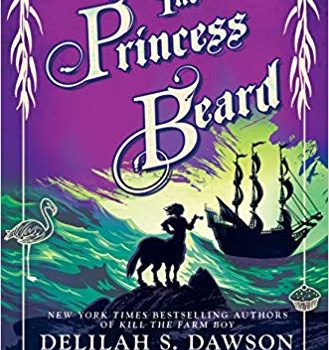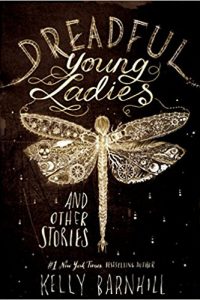Katharine Coldiron Reviews The Princess Beard by Delilah S. Dawson & Kevin Hearne
 The Princess Beard, Delilah S. Dawson & Kevin Hearne (Del Rey 978-1-52479-780-5, $27.00, 384pp, hc) October 2019.
The Princess Beard, Delilah S. Dawson & Kevin Hearne (Del Rey 978-1-52479-780-5, $27.00, 384pp, hc) October 2019.
The Princess Beard, the third of the three-book Pell series co-written by Delilah S. Dawson & Kevin Hearne, is half swashbuckler and half set piece. Like the other two books in the series, it stands alone, with reference to but without dependence on its predecessors, and its tone sits primarily in light, silly humor, dipping occasionally into self-discovery. However, this book is not the best representation of the magic that Dawson and Hearne can perform together. Characterization is somewhat hurried, jokes can lean unimaginative, and adventures feel like digressions, rather than integrated aspects of the story. Still, good fantasy humor is rare enough that The Princess Beard gets a wavering thumbs-up.
Our main characters are Morgan, a courageous and lightly bearded princess; Tempest, a sensitive dryad and aspiring lawyer; Vic, a centaur bro struggling to overcome his ideas about masculinity; Alobartalus, a good-hearted elf; and Luc, a parrot pirate captain who is by far the most interesting figure in the bunch. For the span of the book, these characters sail together, fight together, swab together. They have many foine adventures and uncover a terrible capitalist conspiracy that snaps pretty neatly onto the climate crisis facing the real world today. All ends happily, with much rum and many delicate desserts.
Perhaps appropriately for a pirate novel, The Princess Beard doesn’t use a single unifying quest to propel the narrative. There are cute animals to save and magical creatures to relocate, but the plot, rather than marching along in one direction, diverges multiple times into individual quest lines. Each of the book’s major characters must discard a dream, or really a preconception. Some of these character journeys prove more satisfactory than others. Vic rooting out the training and trauma his father bred in him, and overcoming his ingrained ideas about the value of moving through the world with aggression, happens gradually and organically over the course of the book. But Alobartalus learns in the span of a few pages that, in seeking mentorship from the Sn’archivist of Pell, he’d be throwing his lot in with inanity and squalor. The transformation that results isn’t especially moving or meaningful.
Never meet your heroes, Alobartalus learns, and it’s possible that this is the unifying thread of The Princess Beard. One unfortunate chapter exists largely to cast shade on a famous and problematic author, spending ten full pages mocking the Harry Potter books. Making the house mascots insects, and making the Sorting Hat into a mildewed scarf, and turning Platform 9¾ into a mean practical joke – it doesn’t land right. Compare this to a funny paragraph in Morgan’s first chapter, which asks about her bodily functions while in an enchanted sleep: “Had she wet the bed? Why wasn’t she wearing a diaper and a hospital gown…? How had she kept hydrated and fed? Were her teeth entirely mossy, or had some servant diligently brushed the plaque away?” Such a different kind of splitting hairs about beloved literature.
Also, the jokes in this book seem to err on the side of vulgarity and haste rather than genuine wit. The map of Pell, with its involved and linguistic puns, takes a different level of imagination than naming a pirate Captain Kronch or assembling scatological jokes about “ding gull berries” on an uninhabited island. A long run of humor about the Myn Seas, and a sea serpent within them that devours chocolate and is warded off with tampoons, sits right on the fine line between stupid and clever, as the immortal David St. Hubbins put it.
In the plus column, there are otters. The Princess Beard concerns otters in a big, marvelous way, and a certain subset of readers will enjoy the book for that reason if no other. Plus, the pirate aspects of the novel are genuinely fun, even if they are part of why the book feels more like a picaresque, with disconnected episodes based on ports of call, than a quest narrative. Yarrrr.
On that note, there’s the balm of Luc, the one-eyed parrot who seeks just the right shoulder from which to see the world. His inner thoughts are wise and calculating, a genuine pleasure to read while the other characters flounder amid their flaws and misconceptions: “He knew that the real treasure would not be the friends he made along the way, because that was the kind of metaphorical crap that clogged up a cloaca. Real treasure was real treasure, metaphors were metaphors, and joy was a comfortable shoulder to perch on.” The final (non-epilogue) chapter of the book is titled “In Which the Real Treasure Is the Actual Treasure They Found Along the Way”.
That’s the delightful, postmodern kind of humor that Dawson and Hearne should have tapped more often to write The Princess Beard. (And man, they really missed an opportunity to name one of the Mack islands – Mack Guphinne, Mack Elmorr, Mack Enchiis – Mack Thunife. Ah, well.) This is the final Tale of Pell, supposedly, but it’s a series ripe for revival once its authors have replenished themselves a bit. If and when that happens, I’ll be first in line.
Katharine Coldiron is the author of Ceremonials (Kernpunkt Press), an SPD fiction bestseller. Her work as a book critic has appeared in The Washington Post, The Believer, The Guardian, and many other places. She lives in California and at kcoldiron.com.
This review and more like it in the October 2019 issue of Locus.
 While you are here, please take a moment to support Locus with a one-time or recurring donation. We rely on reader donations to keep the magazine and site going, and would like to keep the site paywall free, but WE NEED YOUR FINANCIAL SUPPORT to continue quality coverage of the science fiction and fantasy field.
While you are here, please take a moment to support Locus with a one-time or recurring donation. We rely on reader donations to keep the magazine and site going, and would like to keep the site paywall free, but WE NEED YOUR FINANCIAL SUPPORT to continue quality coverage of the science fiction and fantasy field.







